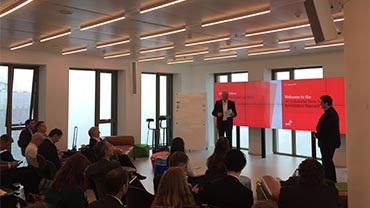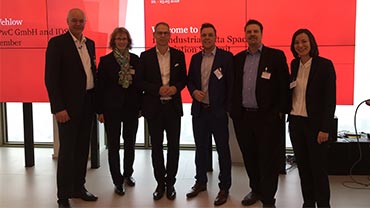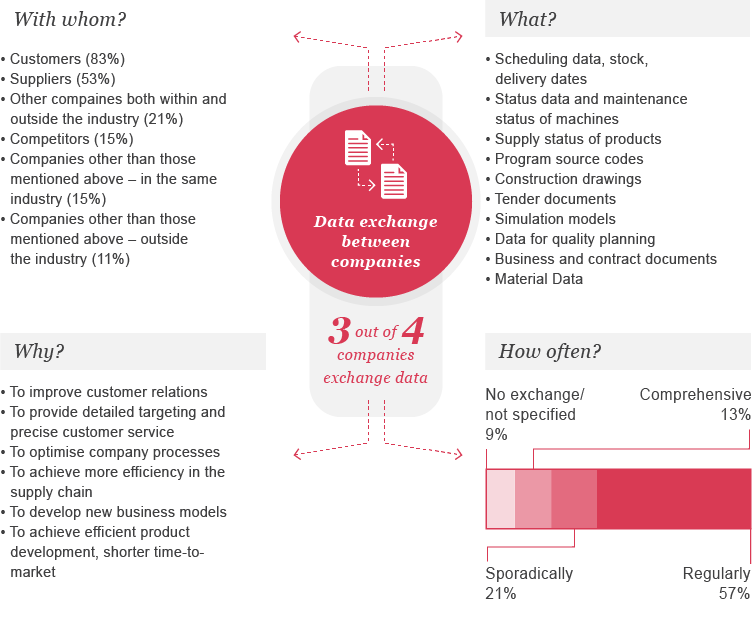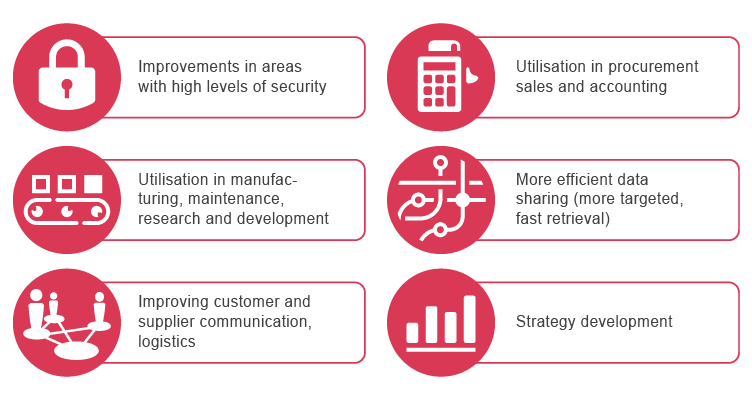Industrial Data Space: the right solution for a secure exchange of data
18 April, 2018
Overview of topics
Premiere: 1st Industrial Data Space Association Summit in Frankfurt
Impressions from the 1st Industrial Data Space Association Summit
The need for data exchange will further increase in the future
The current state of data exchange between companies
Biggest hurdle: fear of losing control over one’s own data
Imagine an open yet secure transfer of information that enables businesses to establish networks and press ahead with digital transformation – Industrial Data Space (IDS), a virtual data room, makes this vision a reality. Its architecture was the focus of a two-day summit held at the Frankfurt PwC Tower, attended by representatives from the areas of industry, research and politics. The goal was to establish common standards, also at an international level, and thus to create the conditions data-driven companies require.
Data and information are the raw materials of the Fourth Industrial Revolution, the foundation for new business models, for value creation and business growth. Data has long since become a separate economic commodity. But companies can only fully exploit the potential of their data by intelligently linking information across companies and industries. One way to securely exchange data is via IDS, a kind of virtual data room that allows organisations to retain sovereignty over their data.
“In order to really leverage the value-adding potential of new digital technologies like artificial intelligence, chatbots or the Internet of Things (IoT), we need huge amounts of data from multiple sources,” says Angelika Pauer, data economy expert at PwC. “These data can only be compiled across industries. IDS enables companies to interconnect in an open data room – without losing control over sensitive information.”
Premiere: 1st Industrial Data Space Association Summit in Frankfurt
But how does this virtual data space work? Who is behind this idea? How can the exchange of data be advanced further, also at the international level? These questions were the focus of the 1st Industrial Data Space Association Summit at the Experience Center in the PwC Tower in Frankfurt. For the first time, experts from across industry, research and politics gathered at the venue to learn more about IDS as an independent standard and to develop it further through lectures and discussions as well as interactive formats such as workshops and use-case pitches.
The host of the two-day event was PwC. The auditing and consulting firm is also a founding member of the International Data Space Association, a non-profit association which works to develop the framework and governance for the virtual data room. Since it was founded in January 2016, the association has been joined by a number of companies from across industry, service and retail, as well as software companies and research institutions. The architecture for IDS is being developed by the Fraunhofer-Gesellschaft. The German Federal Ministry of Education and Research has contributed €5 million to the research project.
Impressions from the 1st Industrial Data Space Association Summit



The need for data exchange will further increase in the future
A recent PwC study, “Datenaustausch als Bestandteil der Digitalisierung” (Data Exchange as an Integral Part of Digitisation) which interviewed more than 200 managers in different industries, shows just how great the need for networking capabilities is among companies. For instance, 80% of respondents confirmed that digitisation has a strong impact on their own business, and 74% expect that the need for data exchange will grow further over the next five years. Even today, companies are already exchanging data with other organisations, especially with customers, suppliers and competitors (see figure). The companies surveyed see clear opportunities arising from inter-company data exchange: in particular, they hope to improve customer relationships by using a more targeted approach (75%), to optimise business processes (71%) and to communicate more efficiently with suppliers (69%).
The current state of data exchange between companies:

The current state of data exchange between companies
Biggest hurdle: fear of losing control over one’s own data
At the same time, a third of respondents fear losing control over their own data and other security risks. This is the main reason why companies have been rather cautious in their approach to data exchange to date and why only a fraction of the data volume created each year has been made accessible. “What prevents the sharing of data is a lack of trust. This can already be seen within companies, starting with the exchange of information between departments and divisions,” says Angelika Pauer, who is responsible for the IDS project at PwC.
In line with this concern, companies have larger expectations for the common virtual data room, as the PwC study shows: 61% of major companies report great interest in the IDS project, primarily hoping to increase data security. More than half of the respondents said they could imagine concrete ways to use IDS in their own company.
The data network can only be used by companies that agree to comply with certain rules regarding security, data protection and the structuring of contracts, among other things. In return, IDS offers them numerous areas of application, for example, in strategy development (further developing products and optimising the product range), customer communication (through a secure exchange of data with the customer) and purchasing and sales (exchange of sales data) (see figure).
Areas of application for Industrial Data Space:

Areas of application for Industrial Data Space
The data are linked using special software, called Industrial Data Space Connector, in a secure network, not a cloud. “We can convince many companies to give it a try when the barriers to entry are as small as possible, especially for small and medium-sized companies,” says Angelika Pauer.
Data management as part of business strategy
Even if the barriers to entry are low, companies wanting to leverage their and other companies’ data to add value need to invest in technology. It is crucial to choose the right technology mix for each company, to structure governance for data management accordingly and to make the data strategy an important part of the business strategy. This is a long-term project, which needs to be anchored at the level of top management but should still involve every single employee. This is the only way to overcome a silo mentality and to enable a type of thinking that spans departments and the entire company – and thus makes it possible for data and the exchange of data to really create value for a company.
Contact us






